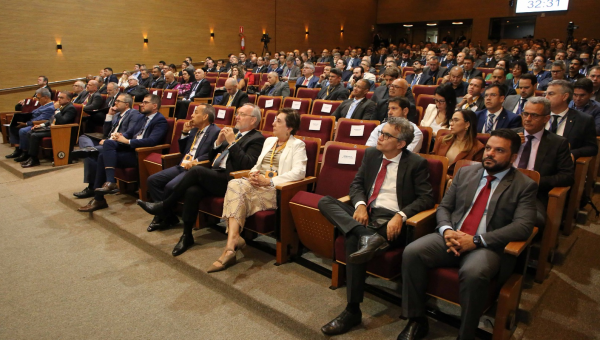
Officially opened by Justice Eurípedes Lamounier, representing the president of the Court of Justice of the State of Tocantins, Justice Maysa Vendramini Rosal, the VI National Meeting on Intelligence in the Judiciary (VI ENIPJ) began with a discussion on reformulating the policy and the systems of security and intelligence of the Judiciary.
The head of the Security Division of the National Council of Justice (CNJ), Fábio de Carvalho Rodrigues Paraguassu, presented the topic during the panel on “Integrated and Interoperative Intelligence in the context of the Policy and National Security System of the Judiciary”, the first activity of the meeting, held in the city of Palmas, state of Tocantins, on Wednesday and Thursday (March 26th and 27th).
Before the lecture, Justice Pedro Nelson de Miranda Coutinho, chief of Justice of the state of Tocantins and president of the Organizing Committee of the VI ENIPJ, welcomed the participants from 25 States plus the Federal District. 
“You can't talk about protecting the assets of the Judiciary without talking about intelligence. We also can't talk about intelligence without recognizing the importance of the diversity of extremely competent men and women who have made a difference in this area where a lot of work is done and not showing up is one of the reasons for choosing the owl as the symbol of the intelligence activity,” said the host.
For the judge, intelligence activities have a multidisciplinary, plural dynamic and require a continuous and attentive look at the changes in society to help make decisions and those responsible must always be ready to listen, learn, evolve and, whenever possible, share. “I hope that this event will be a space for reflection, exchange of knowledge and joint construction,” he said.
Trained and integrated intelligence network
The head of the Security Division of the National Council of Justice (CNJ), Fábio de Carvalho Rodrigues Paraguassu, argues that the reformulation of the intelligence police seeks to improve the mechanisms of the institutional security intelligence units, due to the broadening of factors harmful to the assets of the Judiciary, which require the adoption of a strategy of their own.
 Previously, threats to the judiciary could be classified under three traditional risk factors - criminal organizations, domestic and family violence against women and discontent or opposition to favorable court decisions.
Previously, threats to the judiciary could be classified under three traditional risk factors - criminal organizations, domestic and family violence against women and discontent or opposition to favorable court decisions.
In the current context, according to the speaker, there is a new factor, the ideological extremist, identified with the radicalization of politics, “the use of social networks to spread hate and fake news and systemic attacks on democratic institutions”, which adds to the traditional factors and requires new mechanisms. “In practice, the traditional risk analysis and management tools would not be as applicable and would not be applicable due to a lack of intelligence information,” he said.
“In order to avoid these random events, in this situation of disorder, a strategy of our own is needed, one that gives intelligence units greater capacity to produce knowledge and increases the scope of specialized preventive actions,” he said, defending the integration (joint action) and interoperability (transparent flow of data and information) of the units and intelligence systems of the Judiciary.
As an example, the speaker recalled the 8/11 attacks in the United States, in which the commission's report concluded that the lack of “integration of the Intelligence community was pointed out as a determining factor in the occurrence of the terrorist attacks”.
According to data presented by the professional, the CNJ has identified 82 intelligence centers linked to the Judiciary that are active in the country. The new intelligence policy seeks to make them integrated and interoperable, resulting in integrated actions.
Fabio Paraguassu cited the example of the humanitarian mission of the Judicial Police during the floods in the state of Rio Grande do Sul in 2024 and various actions to protect the authorities responsible for the Health Department of the Socio-Educational System of the Prison System as cases in point for joint action along the lines advocated by the CNJ.
According to the speaker, the principles of legality, legal certainty and public transparency, which are fundamental to this integration, are included in the new national security policy under discussion at the CNJ, which includes various mechanisms for action. Among the other mechanisms mentioned are the express exemption from formalizing cooperative instruments for integrated actions, joint planning and the formatting of a network of interoperable systems for sharing intelligence information. On another front, the CNJ is also discussing the training of professionals in this network, which includes competitions and specialization, including at postgraduate level.
“More than the creation of its own system for producing the fusion of intelligence documents, the aim is to expand the broad sharing of the own databases of the intelligence units. In other words, it's interoperability, the interconnection of the management systems of these databases so that, in an unbureaucratic way, all members of the intelligent community of the Judiciary have access to this data,” he explained.
Programming of the event
The meeting is being promoted by the Court of Justice of the State of Tocantins, through the Center for Intelligence and Institutional Security (NIS), which is coordinated by Justice Jacqueline Adorno, in partnership with the Superior School of the Judges of the State of Tocantins (Esmat).
In line with the National Security Policy of the Judiciary, regulated by the Resolution No. 435 of the National Council of Justice (CNJ), of 2021, the event is coordinated by the chief of Justice of the State, Justice Pedro Nelson de Miranda Coutinho.
To access the hotsite of the meeting, click here.












